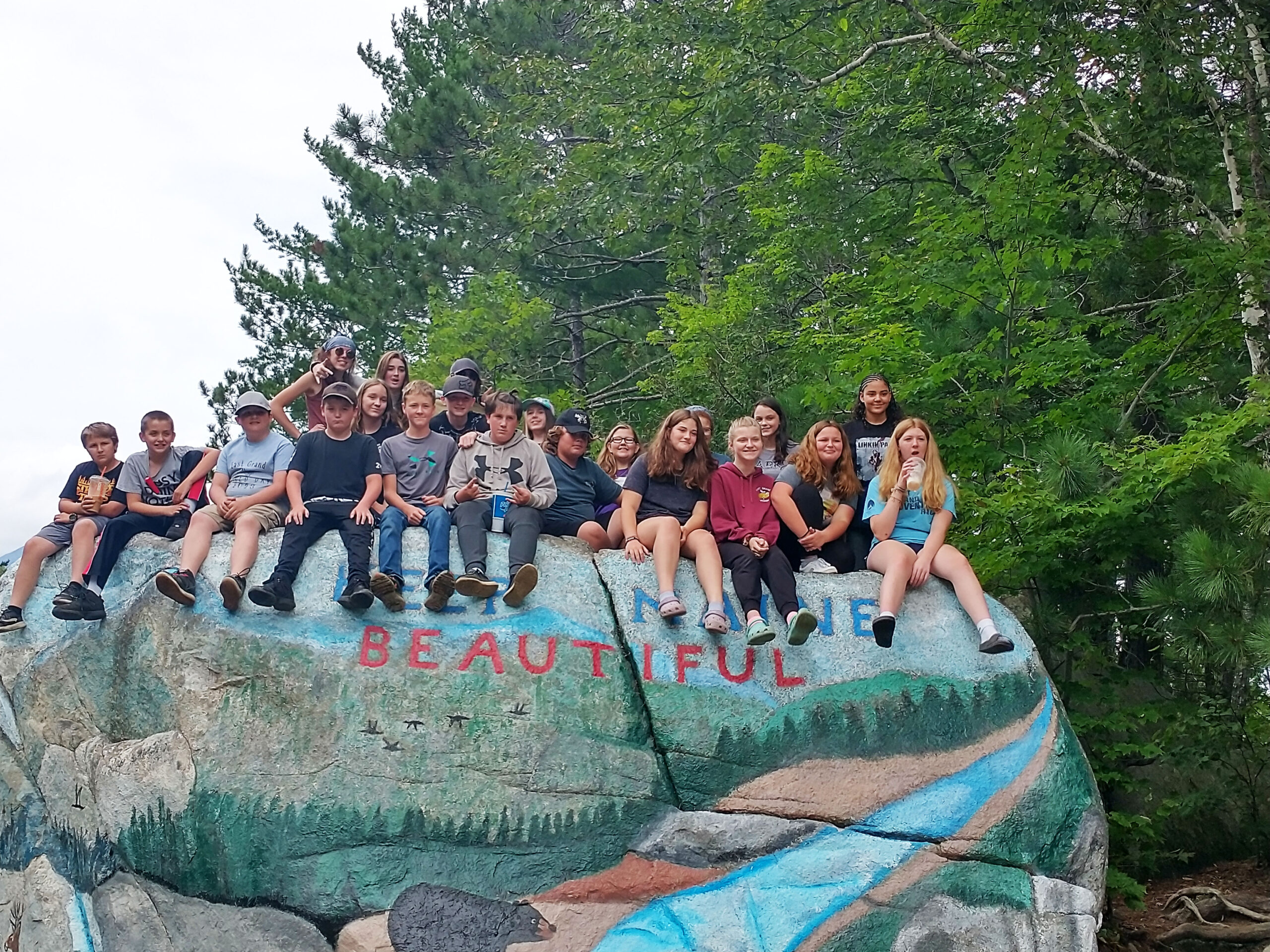
DANFORTH, Maine — Students from East Grand School push their own boundaries in nature’s rugged classroom.
And even though the students, who come from such remote towns as Danforth, Weston, Bancroft, Wytopitlock, Brockton and Reed Plantation, live among these natural resources, most join the school’s outdoor education courses as beginners.
Activities like harvesting and butchering a moose, camping overnight along the Allagash, overcoming fears and taking on white water challenges, canoeing lakes, skiing, fishing, camping and open fire cooking build confidence and teach lifelong skills, said Tammi Matula, physical education teacher and outdoor education program leader.

The whole idea is to allow kids repeated exposure in the outdoors to feel comfortable and build self-esteem. They are learning through practice that if they work hard at something they can achieve their goals. Additionally, students must rely on each other and learn how to work through difficult situations, often building leadership skills, she said.
The East Grand Outdoor Program was one of the first in the state, getting its start more than 20 years ago with tobacco litigation money. Since then, it has added partnerships and career opportunities for students. Most recently, the program expanded from a high school elective course to one that gets all students outdoors, Matula said.
“We don’t have a lot of museums or other advantages of bigger areas, so by utilizing our natural resources we can teach skills that they can take with them for a lifetime,” Matula said.
Research shows that outdoor education programs lead to improved academics, fewer discipline problems and happier students, said Korah Soll, founding director of the Rural Aspirations Project, who has been working with East Grand School for several years.
Year-long outdoor educational offerings, similar to the East Grand program, are popping up around Maine, including in Brewer and Millinocket schools. A long list of short-term summer outdoor education programs support Gov. Janet Mills’ Outdoor Learning Initiative aimed at increasing student access to outdoor learning experiences in the summer.
East Grand’s new principal, Patricia Metta, first met about 23 middle school students when she joined the school camping trip at Big Eddy Campground on the West Branch of the Penobscot River just days before the first day of school this year.
“I’ve never seen a group just come together so easily,” Metta said. “Some of these kids were new and they were not used to this, but they all came together as a group. It was the best trip I’ve been on in quite a while.”

As Metta explained, five East Grand Extended Learning Opportunity students were also on the trip. The East Grand Extended Learning Opportunity program partners with the outdoor education program, offering students a chance to use their new skills in jobs in the area.
The ELO students on the camping trip helped the others, some completely new to camping, set up tents, cook the meals, clean up, pack, unpack and load the boats, Metta said.
Licensed Maine Guides Matula and Dave Conley run the program and take the students on the trips. Conley, who has been with the outdoor program almost since its inception, contracted with the school and over time garnered community and school board support for his position and the program.
The community and grants keep the outdoor program growing, said Matula, who in 2019 was named the Maine Environmental Education Association Eberhard Theile Environmental Educator.
Last Fall Matula and Conley told a game warden that the outdoor program would be interested in harvesting a moose if they had one that was poached. When they got notice of their moose, they set up the school’s outdoor building for the harvest.
“A local meat cutter came to help the students cut up the moose,” Matula said. “We ground it for sausage. We cut up steaks and vacuum-sealed everything. The students all went home with moose meat.”

Third-year East Grand student Alan Emery participated in the moose harvesting class, a first for him, he said, adding that he took all the scraps home to his dogs.
Because of his three years of experience in the outdoor program, Emery worked as a cook at Maine’s Wildlife Management District Zone 1 Moose Camp with Conley last season and he plans on doing it again this year, he said.
Emery was not that excited about coming to school, but the outdoor education program has changed that for him, he said.
Fall means canoeing, hiking, biking and outings on the St. Croix River. As winter sets in, the students cross country ski, learn outdoor cooking, bushwhacking, map and compass reading, downhill skiing at Big Rock and Sugar Loaf and rock climbing in the school’s gym.
In the spring there’s canoe racing and the school’s adventure race that draws in people from the community.
“We’re finding that kids are going out camping on their own and doing this with their friends and family,” Matula said.
Maddie Cowger, 18, who graduated in June, said the outdoor program taught them how to take on a leadership role.
“I started freshman year. I took it because I enjoy being outside. I fell in love with it,” she said. “We had tons of fun like canoe trips, fire building, overnight camping, knot-tying.”
Cowger said that by her junior year she and three other students led the class, creating lesson plans and taking the students on hikes. Matula and Conley met with them and talked about the lessons and then Cowger and other students who had taken the course taught the beginning students, she said.
Cowger, who is studying for her Maine guide license, said all that she has learned from the program will be a huge help.
“I think the program gives students leadership skills, but more so than that it teaches them to take risks. You might fail and if people laugh it’s OK to laugh. They are not laughing at you, they are laughing because it’s fun,” Metta said.







